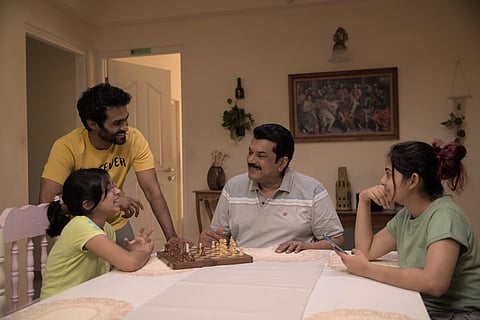Philip's Movie Review: Typical but an effective feel-good drama
Rating:(3 / 5)
Philip's screams feel-good cinema from frame one. Malayalam feel-good cinema is a distinct genre that you can identify from a long distance. Warm colour palettes, aesthetically decorated backdrops, soulful music and elegantly dressed actors who speak of rains and rainbows... these are some primary constituents. But none of that would matter if the content doesn't let you relax and... feel good. Though not always in the right measures, Philip's has enough of them all.
Cast: Mukesh, Noble Thomas, Innocent, Navani Devanand, Quinn Vipin
Director: Alfred Kurian Joseph
Alfred Kurian Joseph, one of the writers of Helen, weaves his directorial debut around a middle-aged man named Philip and his three children, Basil, Blessy and Betty. Alfred and his co-writer Mathukutty Xavier, the director of Helen, waste no time in registering the primary characters by employing a sitcom-style narrative of jumping from one episode to another. Through a series of events, we learn that Philip is an orthodox-yet-fun dad, heavily concerned about his children's future. Basil is the responsible big brother, who's also secretly nursing a longtime dream with his next-door girlfriend. Blessy is the brash, impulsive teenager, who doesn't get along with her younger sister, a Chess-loving geek. In filmmaking, they say half the battle is won if you get the casting right, and Philip's is a testimony to that. Mukesh shoulders the film neatly with his trademark wits and affable persona. He is ably supported by the other three main actors, Noble Thomas, Navani Devanand, and Quinn Vipin. Noble is mostly effective, except during a heated confrontation scene with Mukesh, where he struggles to get his emotions right. Despite being newcomers, young Navani and Quinn display no signs of inexperience and manage to leave a lasting impression.
Apart from some occasional counters and recall of Mukesh's popular dialogues, the first half lacks genuinely funny moments despite having immense potential. For the most part, the writers follow familiar beats before throwing in the conflict from nowhere—quite literally. But fortunately, after that sudden jolt, the narrative becomes more organic and you start developing an emotional connection with the characters. You see how they gradually break down in the face of crisis and then pick themselves up. Briefly, the film turns serious, but the makers dial down the melodrama. They instead believe in easy solutions, which they achieve through heartwarming music (who better than Hesham now?), a few smiles here, and a few glances there. But honestly, this Vineeth Sreenivasan-esque mood can get overwhelmingly sweet after a point.
Philip's will perhaps be best remembered as a fitting swansong for Innocent. The late actor does what he does best—playing the good Samaritan. As Mani Uncle, he is the friendly father-figure who is always there for the family. It's a role tailor-made for him as he once again shares a beautiful rapport with Mukesh. As the end credits roll with a special compilation video of Innocent's best works, it's hard not to get emotional. A feel-good finale indeed.

